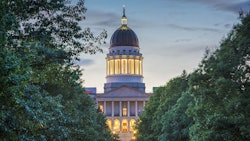
The Cherokee Nation, one of the largest tribes in the U.S., has formed a work group to study various facets and potential benefits of hemp and cannabis.
Under Cherokee law, it is currently illegal to use or possess cannabis on all tribally owned properties. The tribe, based in Tahlequah, Okla., recently revised its workplace drug use policy to protect employees and applicants who possess a valid medical marijuana patient license. Oklahoma legalized medical cannabis in 2018.
“As chief, I want well-informed policy, and the team we have assembled will be a great asset in that regard. I believe there are opportunities for Cherokee Nation, our businesses and our citizens to benefit from this emerging industry. But we need to move forward carefully and responsibly and in absolute strict adherence to the law in order to ensure success and sustainability,” said Cherokee Nation Principal Chief Chuck Hoskin Jr. in a press release.
The new group, called the “Executive Work Group on Hemp, Cannabis and Related Opportunities,” will explore opportunities for cannabis in commerce, health care and agriculture. The group plans to study legal and ethical implications of hemp and cannabis use and growth, as well as the role they may play in the tribe’s health services system.
The group will also study the opportunities for Cherokee citizens to raise, process and sell hemp and cannabis.
Ultimately, the group will make recommendations on updating internal Cherokee Nation policies and statutes regarding the growth and use of the crops.The work group will report its recommendations to the principal chief and council of the Cherokee Nation no later than May 31.
The Cherokee Nation has more than 380,000 tribal citizens, making it one of, if not the largest, in the country.
If the tribe legalizes any form of cannabis, it will join a growing number of tribes embracing the crop for its economic and health benefits. Tribes create and follow their own jurisdictions, so several across the country have already begun cultivating cannabis for medical and recreational use.
According to the U.S. Department of Agriculture's (USDA) website, 23 different tribes so far plan on taking part in their own hemp programs. Three have already been approved, including in South Dakota, where hemp cultivation is currently illegal.
Members of the Cherokee work group include:
- Chad Harsha, Cherokee Nation secretary of natural resources (chairman)
- Tina Glory-Jordan, secretary of state
- Todd Enlow, chief of staff
- Paden Qualls, assistant attorney general
- Andy McMillan, Cherokee Nation businesses
- Kim Teehee, executive director of government relations
- Dr. Roger Montgomery, Cherokee Nation health services
“The work group established by Chief Hoskin is a substantial step for the Cherokee Nation [to] evaluate the changing regulatory environment surrounding hemp and cannabis in areas of commerce, agriculture and health care,” Harsha said. “I look forward to working with this team to bring clarity on these issues and to present policy recommendations that will advance the Cherokee Nation in these emerging areas.”


























